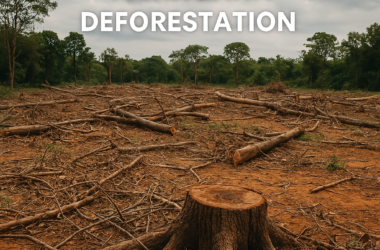Climatic changes are reshaping the environment and creating significant health challenges for individuals worldwide. The rising temperatures, fluctuating weather patterns, and increasing pollution levels directly impact physical and mental well-being. Sudden weather variations disrupt ecosystems, creating conditions favorable for the spread of diseases. Understanding how climatic changes affect health can help individuals adopt preventive measures and maintain a better quality of life. Governments and communities must collaborate to minimize health risks associated with these changes. Proper awareness and timely interventions are essential for a healthier and sustainable future.
1. Impacts of Climatic Changes on Physical Health
Climatic changes are causing severe fluctuations in temperatures, weakening immunity, and increasing susceptibility to diseases. Prolonged exposure to heatwaves can lead to dehydration, heat exhaustion, and severe heat strokes. Conversely, unexpected cold waves contribute to a rise in respiratory infections, such as flu and pneumonia. Rising air pollution exacerbates asthma, bronchitis, and other chronic respiratory issues. Floods, often linked to erratic climatic patterns, increase waterborne diseases like cholera and typhoid. People living in areas with extreme weather often face greater physical health risks. Regular exercise, balanced nutrition, and sufficient hydration can mitigate these effects.

Mosquito-borne diseases like dengue and malaria thrive during unseasonable rainfall, another consequence of climatic changes. Preventive actions, such as using mosquito nets and repellents, can significantly reduce these risks. Prolonged exposure to UV rays, intensified by ozone depletion, increases the risk of skin cancer and other dermatological issues. Wearing protective clothing and sunscreen can help safeguard skin health. Physical health challenges require consistent monitoring to ensure individuals adapt to the rapidly changing climate effectively.
2. Mental Health Challenges Linked to Climatic Changes
Climatic changes are not just physical but also psychological stressors. Natural disasters, like hurricanes or wildfires, cause trauma and long-term mental distress. The unpredictability of such events leads to heightened anxiety levels in affected communities. Rising temperatures disrupt sleep patterns, causing irritability and reducing overall productivity. Seasonal Affective Disorder (SAD), a form of depression, becomes prevalent during extended cold and dark winters.

Social isolation increases as extreme weather events limit outdoor activities and mobility. This isolation can exacerbate feelings of loneliness and depression. Communities often face economic stress due to crop failures, leading to increased mental health challenges. Building mental resilience through mindfulness practices and professional counseling is vital. Promoting open conversations about mental health issues reduces stigma and encourages people to seek help.
Climatic changes also influence behavior, making people more prone to stress-related conditions like hypertension. Maintaining emotional stability during these challenges requires regular relaxation techniques, such as meditation or yoga. Supporting one another in adapting to these changes can create stronger, more resilient communities.
3. Nutrition and Climatic Changes
Climatic changes disrupt agricultural cycles, leading to reduced food availability and nutritional deficiencies. Droughts limit water resources, impacting the cultivation of essential crops like rice and wheat. Erratic weather patterns often lead to poor harvests, reducing access to fresh, local produce. As food prices rise due to scarcity, many families turn to processed, less nutritious options, exacerbating health issues. A lack of essential nutrients weakens immunity, making individuals vulnerable to diseases.
Water quality also deteriorates during floods, increasing the likelihood of consuming contaminated food. Climatic changes create an imbalance in ecosystems, affecting livestock and fisheries. This imbalance directly impacts protein intake for communities reliant on animal-based diets. Incorporating a variety of nutrient-dense foods, such as lentils, nuts, and green vegetables, can help overcome deficiencies.

Urban areas often face additional challenges due to limited access to affordable, organic produce. Encouraging urban farming and community gardens can mitigate these issues. Governments must invest in sustainable agricultural practices to ensure food security amid climatic changes. Educating communities about the importance of balanced diets is equally crucial.
4. Building a Healthier Lifestyle Amid Climatic Changes
Adapting to climatic changes requires adopting healthier lifestyle habits. Regular exercise boosts immunity and prepares the body for temperature variations. Including antioxidant-rich foods in daily meals helps combat environmental stressors. Staying hydrated is critical to maintaining optimal bodily functions during extreme weather. Protective measures like wearing breathable fabrics and applying sunscreen can prevent heat-related issues.
Routine health checkups help identify potential problems early, reducing long-term complications. Vaccinations remain vital in preventing outbreaks of diseases like cholera and typhoid during extreme weather events. Avoid overexposure to harsh weather conditions by staying indoors during heatwaves or storms. Adopting simple habits, such as keeping homes ventilated and maintaining hygiene, can prevent diseases.

Communities can play a role by promoting tree planting and green spaces to combat urban heat islands. Schools and workplaces should educate individuals about coping mechanisms for climatic changes. A focus on holistic well-being helps individuals navigate the challenges of a changing climate. Collective efforts can create a healthier and more resilient society.
Conclusion
Climatic changes profoundly affect physical and mental health, demanding urgent attention and proactive strategies. Understanding these impacts empowers individuals to make informed decisions for healthier living. By focusing on nutrition, mental health, and lifestyle adjustments, people can mitigate the adverse effects of climatic changes. Governments, organizations, and communities must collaborate to promote sustainable practices. Together, these efforts ensure a healthier future amid the ongoing challenges posed by a changing climate.
Utpal Khot
Copyright © Utpal K
1. If you share this post, please give due credit to the author Utpal Khot
2. Please DO NOT PLAGIARIZE. Please DO NOT Cut/Copy/Paste this post.
© Utpal K., all rights reserved.
Copyright Notice: No part of this Blog may be reproduced or utilized in any form or by any means, electronic or mechanical including photocopying or by any information storage and retrieval system, without permission in writing from the Blog Author Utpal Khot who holds the copyright.





